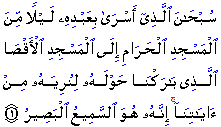Today's Reminder
December 26, 2025 | Rajab 6, 1447
Living The Quran
New Leadership
Al-Isra (The Ascension) Chapter 17: Verse 1
 "Glory to (God) Who did take His servant for a Journey by night from the Sacred Mosque to the farthest Mosque, whose precincts We did bless, - in order that We might show him some of Our Signs: for He is the One Who heareth and seeth (all things)."
"Glory to (God) Who did take His servant for a Journey by night from the Sacred Mosque to the farthest Mosque, whose precincts We did bless, - in order that We might show him some of Our Signs: for He is the One Who heareth and seeth (all things)."
It is not known exactly when the Night Journey and Ascension took place, but it was certainly before the Hijrah (emigration from Makkah) to Madinah. It was said to have happened either three years or 18 months before the Hijrah.
Al-Isra was a land-to-land journey that Allah Almighty caused His Prophet (peace and blessings be upon him) to make from Makkah to Jerusalem, that is, from Almighty Allah's Sacred House to Al-Aqsa Mosque.
Al-Miraj was a land-to-heaven journey from Jerusalem to the heavens. It was a journey to a place that no human being other than the Prophet (peace and blessings be upon him) had ever reached [or has reached since]. It was a journey to the Lote Tree of the utmost boundary, whose place only Almighty Allah knows.
Such two journeys were a turning point in the Prophet's life and in the course of his call in Makkah, especially after all the suffering he (peace and blessings be upon him) had faced at the hands of the Quraysh.
Allah Almighty wanted Al-Isra and Al-Miraj be an alleviation and relief to His Prophet (peace and blessings be upon him). He Almighty wanted to tell His Prophet that if the people of the earth had let him down, the people of heaven were there to support him; if the people of the earth had rejected his call, Allah Almighty would receive him and His Prophets (peace and blessings be upon them) would follow him and he would be their imam.
We must believe that Allah Almighty is with us and that He Almighty will grant us victory and make Islam prevail, as He, Most High, always supports the true believers.
That journey was an honour and compensation to the Prophet (peace and blessings be upon him) from Almighty Allah. It was also a preparation for him to the following stage of his call. A few years later, he (peace and blessings be upon him) would migrate to Madinah, where he (peace and blessings be upon him) would lead a life of strife and jihad and confront the Arab tribes and other parties that would stand as one man against his international call.
Prophet Muhammad's being received by other Prophets of Allah Almighty in Al-Aqsa Mosque and his leading them in Salah (ritual Prayer) there indicates that leadership was moved to a new nation and to a new Prophethood.
Compiled From:
"Al-Israa’ and Al-Mi`raj: Everlasting Lessons" - By Yusuf Al-Qaradawi
From Issue: 589 [Read original issue]
Understanding The Prophet's Life
Sharing the Feeling
It is reported by Ibn Abbas that when the Prophet (peace be upon him) and his companions came to Makkah, they were weakened by the fever in Yathrib. Thereupon the idolaters said "A people weakened with fever have come to you and they are afflicted with evil." Allah, the Almighty, informed His Prophet (peace be upon him) about their saying. So he commanded them to jog through the first three rounds of tawaf around the Kabah, and to walk between its two corners. When the idolaters saw the Muslims jogging, they said: "Are those the people you said are weak because of the fever? They are stronger and sturdier than us!" Ibn Abbas added: "The Prophet (peace be upon him) did not command them to jog all through the seven rounds in order not to overexert themselves." This was reported by Bukhari, Muslim, and Abu Dawud, whose wording is given here.
Umar was of the opinion that jogging be stopped as there was no longer any need for it after the Muslims had become strong and powerful. But he decided, however, to leave it (in its original form) so that the future generations of Muslims could share a form and a feeling similar to that observed and felt by early Muslims. Muhibbuddin At-Tabari said: "Sometimes certain instructions are prescribed in the religion for a specific reason, and later even though that specific reason no longer exists yet the instructions still remain valid."
Zaid bin Aslam reported from his father that he said: "I heard Umar ibn Al-Khattab saying: 'Why jog around the Kabah today? Why uncover our shoulders (in tawaf)? Allah has made Islam strong and powerful, and banished disbelief and the disbelievers, yet we shall never abandon what we used to do in the time of the Prophet (peace be upon him)."
Compiled From:
"Fiqh-us-Sunnah" - As-Sayyid Sabiq
From Issue: 805 [Read original issue]
Cool Tips!
Domino Effect
Don't be like a line of falling dominos, where one mistake leads to another and another and another. Sometimes when we slip up we think: "Well, I've already blown it. Who cares what happens now?" Just remember, one mistake isn't as bad as two or three mistakes. If you've done something you regret, stop the dominos from falling by taking control and not making another mistake.
Remember, today is not forever. The desperate situation you may be in now will get better if you go to work on it. Things change, people forgive, hearts can be made whole, and life can be good again.
Compiled From:
"The 6 Most Important Decisions You'll Ever Make" - Sean Covey, p. 219
From Issue: 807 [Read original issue]